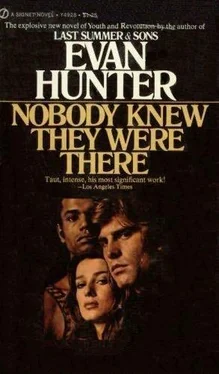Evan Hunter - Nobody Knew They Were There
Здесь есть возможность читать онлайн «Evan Hunter - Nobody Knew They Were There» весь текст электронной книги совершенно бесплатно (целиком полную версию без сокращений). В некоторых случаях можно слушать аудио, скачать через торрент в формате fb2 и присутствует краткое содержание. Город: New York, Год выпуска: 1971, ISBN: 1971, Издательство: Doubleday & Company, Жанр: Проза, на английском языке. Описание произведения, (предисловие) а так же отзывы посетителей доступны на портале библиотеки ЛибКат.
- Название:Nobody Knew They Were There
- Автор:
- Издательство:Doubleday & Company
- Жанр:
- Год:1971
- Город:New York
- ISBN:978-0094575004
- Рейтинг книги:4 / 5. Голосов: 1
-
Избранное:Добавить в избранное
- Отзывы:
-
Ваша оценка:
- 80
- 1
- 2
- 3
- 4
- 5
Nobody Knew They Were There: краткое содержание, описание и аннотация
Предлагаем к чтению аннотацию, описание, краткое содержание или предисловие (зависит от того, что написал сам автор книги «Nobody Knew They Were There»). Если вы не нашли необходимую информацию о книге — напишите в комментариях, мы постараемся отыскать её.
Nobody Knew They Were There — читать онлайн бесплатно полную книгу (весь текст) целиком
Ниже представлен текст книги, разбитый по страницам. Система сохранения места последней прочитанной страницы, позволяет с удобством читать онлайн бесплатно книгу «Nobody Knew They Were There», без необходимости каждый раз заново искать на чём Вы остановились. Поставьте закладку, и сможете в любой момент перейти на страницу, на которой закончили чтение.
Интервал:
Закладка:
Raines flew heavy bombers out of Norwich in raids France 1943 and Germany 1944. His B-24 shot down by “Abbeville Boys,” German FW-109s based that city. Raines led five surviving members his crew south. In encounter with German patrol vicinity Rouen, Raines wounded in left leg, but with radioman-sergeant engaged six of enemy hand-to-hand, both later awarded Silver Star. When contact made with Rouen resistance group and attached American Intelligence Officer, shattered bones in leg had seriously impaired circulation, danger of gangrene imminent Crew returned safely to England, Raines hidden and nursed two months in cellar of French farmhouse before departure Spanish border August 1944.
At onset investigation (July), Raines had already left for rented beach house in California, adjacent year-round home of married daughter by second marriage (Mrs. Robert Stark). Raines’s summer activities vigorous and varied. Older man, he is nonetheless athletic, plays tennis every morning at municipal courts, takes son-in-law’s boat out frequently for deep-sea fishing. He holds local record (1972) for largest marlin caught these waters.
Though exclusively summer resident, he is interested town affairs, attends most town meetings. (Town Board minutes August 1970 record bitter protest from Raines against waterfront pollution from local shore restaurant. Robert Stark, his son-in-law, assured Board measures would be taken to remedy situation.) Stark is an attorney representing many locals, reputed member John Birch Society. Impression in town is no love lost between two men, or for that matter between Raines and own daughter. Neighbor up beach says Raines goes there to visit each year because Janice Kay would not see him otherwise; suggested her animosity due to way Raines treated mother when she was still alive. (Charlotte died cancer August 1971, shortly after Second Pentagon March. Raines's only daughter was born August 6, 1950, putting Janice Kay’s age at twenty-four. She is a graduate of U.C.L.A., was psychology major there during occupation by military prior to presidential election of 1972.)
Raines campaigned vigorously in that election, touring Western states to make speeches for the Senator at colleges and universities. In Texas, at one such speaking engagement, he was pelted with eggs while voicing personal opposition to the war. Has been outspoken about it since inception, but has made no public comment since Harvard Riots 1973. At Western Methodist University, Raines highly regarded by colleagues and students alike, said to have unique grasp of subject and magnetic classroom personality. (Outside classroom, he is renowned as voluminous teller jokes, and formidable drinker.) He is due for sabbatical 1975, has been making extensive inquiries local travel agencies about possibility renting small inexpensive house Italy next year. One travel agent offered information that now Raines’s wife dead, he free to gallop off with his “doxy.” This, coupled with daughter’s alleged animosity, led to subsequent search possible relationship with woman other than wife. Discreet questioning colleagues indicates Raines devoted to wife until her death, rules out any possibility illicit relationship existing. Suggest that daughter’s alienation due influence her husband, whose politics differ Raines’s drastically.
Mediator recent panel discussion (September 12, 1974) local television Channel 2 asked Raines define comment he made after Senator conceded in November 1972: “It doesn’t end here; it only begins.”
Raines replied he had no memory of ever having made such a statement.
Saturday, October 26
I cannot visit the bridge again because my follower is constantly behind me, a black shadow stalking me across the university streets. I ask the desk clerk where the good skiing is, and he tells me it’s twenty-five miles north of the town, on Route 17. The area is called Snowclad, and it is mostly intermediate skiing, he says, though there are a few good expert trails.
“Are you a good skier?” he wants to know.
“I used to ski a lot,” I tell him.
“Gave it up, or what?”
“Gave it up,” I say.
The clerk at the car rental place knows me by name now. He inquires after my health and the state of my business, and then signs out a snow-tired Mustang to me. He also gives me a local map, and marks the route to Snowclad on it. He tells me that I can rent equipment there, and then asks if this is my first time skiing. I tell him essentially what I had told the desk clerk. Through the plate glass window, I can see my follower waiting outside, clearly perplexed. Is it possible he does not own a car? For a moment, I consider driving out to the bridge again. There is much work to be done, and time is short. But I realize I cannot take that chance. I head north out of town, constantly checking the rearview mirror. I honestly do not know whether I am still being followed or not. My son Adam used to dress very casually for skiing. Unlike David, who at that time fancied racing pants and hard helmets, Adam wore dungarees and sweater, a shaggy old raccoon coat he bought on Third Avenue, no hat. I am dressed somewhat the way Adam used to dress. I am wearing a pair of old gray flannels and a woolen sports shirt and a bulky crew-neck sweater. Over that, because I did not think to bring a ski parka with me (one rarely brings a ski parka with him when he is going West to commit murder), I wear my sports jacket It is colder at Snowclad than it was in town, a good ten degrees colder. I am not wearing thermal underwear, and my gloves are the thin leather ones I usually wear with my brown overcoat It occurs to me that I am about to freeze my ass off.
The man in the rental shop fits me out with Head skis and buckle boots. I nag him about the bindings. He keeps telling me if he makes them any looser, I will fall out of the skis executing the simplest turn. But I am not here to break a leg, and I do not intend to do any hard skiing today. I insist on a setting that will guarantee release under the slightest pressure, and he reluctantly makes the adjustments. In the ski shop, I buy a pair of leather mittens with woolen liners. I am still very cold, but now at least my hands will be warm. (If your hands are warm, Sammy,” my mother used to say, “you’ll be warm all over.”)
He was, my son Adam, a tall handsome boy with flashing blue eyes and the blackest hair. I took him skiing for the first time when he was six years old, up to Stowe in Vermont. By the time he was eight, he was skiing the top of Mansfield and coming down trails like the International, and the Nose Dive with its famous Seven Turns, the names of which alone struck terror into my heart
I think of him a great deal that afternoon at Snowclad. Alone on the double chair, I think of Adam. Coming down the gentlest trails, giant spruces sliding past, I ski effortlessly and think of Adam. The last time I really talked to my oldest son was two years ago come Christmas, shortly after the election. We had gone to Sugarbush for the holidays and he told me in the frost-rimed gondola as we approached the fairy-tale summit of the mountain that he had dropped out of school. And we talked. And our breaths pluming from our mouths added to the accumulated rime on the gondola’s plastic dome, layer after layer of words crusting on the plastic. It was the last time we talked together. In January, he went back to Washington, D.C., where he shared an apartment with two other boys and a girl named Felice. I shall always love that girl’s name, Felice, though I never met her and never will.
He is dead, my son Adam.
I am here because he is dead.
The ticket seller at the railroad depot seems not at all suspicious of me. I have come here because I am fairly certain now that my follower is not with me. I tell the ticket seller that I am thinking of catching the train east, but that I’m worried about all that snow on the tracks.
Читать дальшеИнтервал:
Закладка:
Похожие книги на «Nobody Knew They Were There»
Представляем Вашему вниманию похожие книги на «Nobody Knew They Were There» списком для выбора. Мы отобрали схожую по названию и смыслу литературу в надежде предоставить читателям больше вариантов отыскать новые, интересные, ещё непрочитанные произведения.
Обсуждение, отзывы о книге «Nobody Knew They Were There» и просто собственные мнения читателей. Оставьте ваши комментарии, напишите, что Вы думаете о произведении, его смысле или главных героях. Укажите что конкретно понравилось, а что нет, и почему Вы так считаете.












